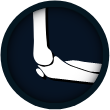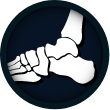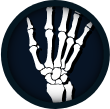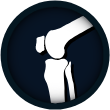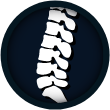Rotator Cuff Tear
The rotator cuff is a group of muscles and tendons that surround the shoulder joint, keeping the head of your upper arm bone firmly within the shallow socket of the shoulder. A rotator cuff tear occurs when there is a rip in this group of muscles and tendons. A rotator cuff injury can cause a dull ache in the shoulder, which often worsens with use of the arm away from the body.
There are 2 types of rotator cuff tears- partial tear and complete tear.
WHAT ARE THE SYMPTOMS?
Symptoms of a rotator cuff tear include:
- Pain in the shoulder that feels like a dull ache
- Having trouble raising your arm
- Arm weakness
- Unable to lift things that you usually are able to
- Clicking or popping sounds when you move your arm
- Trouble sleeping
Should you experience any of these symptoms, seek help from your doctor immediately. If not, your rotator cuff tear may evolve into a frozen shoulder or arthritis over time, which are much harder to treat.
WHAT ARE THE CAUSES AND RISK FACTORS?
Factors that increase your risk of getting a rotator cuff tear include:
- Age
As you get older, your risk of a rotator cuff injury increases. Rotator cuff tears are most common in people over 60.
- Occupation
Jobs that involve repetitive overhead arm motions, such as painters or construction workers damages the rotator cuff overtime, putting you at a higher risk of a rotator cuff tear.
- Family history
There may be a genetic component to rotator cuff tears as they happen more often in certain families.
- Athletics
Sports that involve overhead arm motions such as basketball, golf and swimming increase your risk of rotator cuff tears.
WHAT IS THE DIAGNOSIS?
A history of the injury and a physical examination of the shoulder will be conducted by the Doctor to find out if you have a rotator cuff tear. Your range of motion and muscle strength will be examined by the Doctor.
Imaging tests such as an MRI, x-ray or ultrasound may also be taken for the Doctor to further examine your condition, should there be a need to.
WHAT ARE THE COMPLICATIONS?
If prompt treatment is not received for your rotator cuff tear, your shoulder joint may deteriorate and you may experience weakness in your shoulder, or even be unable to move your shoulder. In the long-term, this may evolve into a frozen shoulder as your connective tissue can thicken up and become tight.
WHAT ARE THE TREATMENT OPTIONS?
At Cove Orthopaedic Clinic, nonsurgical treatments are always the first line of treatment. This includes:
- Application of hot or cold packs to the affected area to reduce swelling
- Physiotherapy to strengthen the shoulder muscles and restore the range of motion
- Medications such as acetaminophen or anti-inflammatory drugs such as ibuprofen to relieve pain and swelling
- Injecting cortisone (steroid injections) into the affected area, to reduce inflammation
- Resting the arm to let the rotator cuff heal
Should these methods not work, surgery is required especially if there is a complete tear in your rotator cuff.





